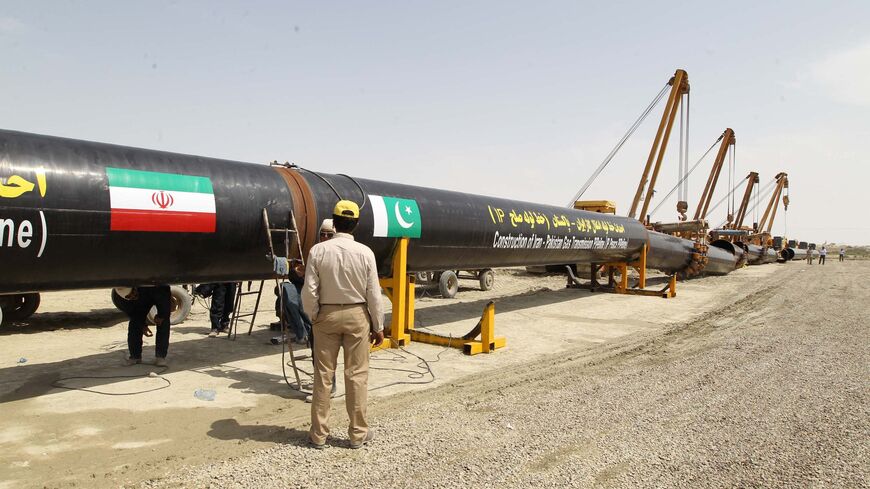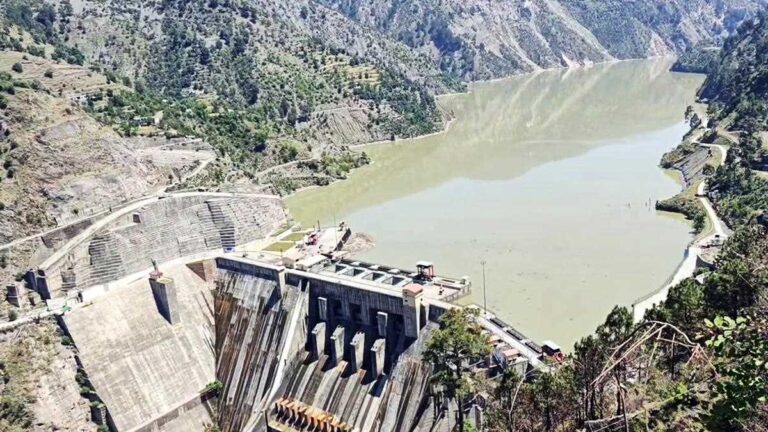
Source: Al-Monitor/ Getty Images
Haider Ali
In the complex tapestry of South Asian geopolitics, the Iran-Pakistan (IP) Gas Pipeline project stands out as a crucial geoeconomic asset for Pakistan. Despite significant threats of international sanctions and geopolitical pressures, particularly from the United States, the completion of the Pipeline is essential for ensuring Pakistan’s energy security, enhancing its strategic autonomy in the region, and achieving much-needed economic stability.
Energy scarcity has critically hampered Pakistan’s economic growth. With dwindling domestic gas reserves and escalating demand, a reliable, affordable energy solution is imperative. The IP Gas Pipeline, projected to transport natural gas from Iran’s South Pars field, offers a sustainable solution to this dilemma.
Conceived in 1995 and intended to connect Iran’s vast gas reserves with Pakistan’s energy grid, the IP Gas Pipeline was envisioned as a exemplar of regional cooperation. Despite Iran completing its section by 2013, Pakistan has faced challenges in fulfilling its part, largely due to financial constraints exacerbated by geopolitical pressures from the U.S. These pressures include threats of sanctions under the Iran Sanctions Act, complicating Pakistan’s economic engagements.
Strategically, the IP Gas Pipeline is pivotal for Pakistan in reducing its overwhelming reliance on imported oil, which strains its economic stability due to high costs and price volatility. By transitioning to a more affordable and stable natural gas supply, Pakistan can alleviate substantial economic pressures and improve its energy security. This transition is not merely about energy. if anything, it is also about stabilizing Pakistan’s economy by lowering industrial energy costs, thereby boosting productivity and competitiveness in the global market. Moreover, the Pipeline will enhance Pakistan’s strategic depth by diversifying its energy sources. Currently, Pakistan heavily depends on the Gulf states for its oil supplies. The IP Pipeline provides an alternative that could help Pakistan reduce this dependency, thereby allowing more maneuverability in its foreign policy and reducing the geopolitical leverage that other states hold over it due to its energy insecurity.
Engagements on the Pipeline also send a signal to the broader international community about Pakistan’s willingness to pursue its national interests despite external pressures, particularly from the United States, which has expressed strong opposition to the project due to its broader sanctions regime against Iran. Engaging with Iran on this project demonstrates Pakistan’s assertiveness in foreign policy, emphasizing its sovereignty over its economic and strategic decisions.
Furthermore, the IP Pipeline project can potentially enhance Pakistan’s role as a regional energy partner, particularly if future expansions bring other countries, including China, under projects like the Belt and Road Initiative (BRI). This could elevate Pakistan’s strategic importance as a transit state, not only enhancing its geopolitical standing but also providing economic benefits through transit fee and job creation.
Economically, the Pipeline is projected to deliver significant cost savings by providing up to 750 million cubic feet of natural gas per day, substantially reducing the country’s reliance on expensive imported fuels. The direct impact on Pakistan’s energy costs and its broader economic landscape underscores the Pipeline’s geoeconomic importance.
From a geoeconomic perspective, the Pipeline enhances Pakistan’s energy sovereignty, reducing its susceptibility to international oil market fluctuations and geopolitical whims of traditional allies, such as the Arab states and the United States. Moreover, strengthening ties with Iran by completing this Pipeline will offer Pakistan a strategic counterbalance in its regional dealings, providing leverage in broader geopolitical and economic negotiations.
Transitioning from oil to natural gas through the IP Pipeline also aligns with global environmental priorities, offering a cleaner alternative to coal and oil. This shift will not only support global efforts to reduce carbon emissions but also enhance Pakistan’s standing in international environmental dialogues.
However, the Iran-Pakistan Gas Pipeline faces significant challenges that stem largely from geopolitical dynamics and economic constraints. Chief among these is the threat of international sanctions, particularly from the United States, which has vehemently opposed the project due to its broader sanctions regime against Iran. These sanctions have not only hindered financial investments and international collaborations crucial for the Pipeline’s completion but has also instilled a sense of caution among potential stakeholders. Additionally, Pakistan’s own economic vulnerabilities, such as a high debt burden and fluctuating fiscal health, have further complicated the mobilization of necessary resources.
To overcome these hurdles, a multi-faceted approach is essential. Pakistan can make robust diplomatic efforts to seek sanction waivers, akin to those received by other countries like India for their energy projects with Iran. Building a coalition of regional allies and involving influential global powers, such as China, through initiatives BRI can provide the necessary political and financial backing. Moreover, leveraging Pakistan’s strategic importance and potential as a regional energy hub can attract investments and partnerships that align with broader economic and geopolitical interests. By adopting these strategic measures, Pakistan can navigate the complex landscape of international politics and economic pressures to realize the potential of the Iran-Pakistan Gas Pipeline.
The Iran-Pakistan Gas Pipeline transcends mere energy supplies; it is a strategic geoeconomic asset that is pivotal for Pakistan’s long-term energy security and economic independence. The project aligns with the principles of geoeconomics, where energy policy is used as a lever in international relations and economic strategy. As such, prioritizing its completion is not only a matter of national interest but also a crucial step towards regional integration and integration.
Haider Ali is an MPhil Political Science Scholar at the School of Integrated Social Sciences, The University of Lahore.
The views expressed in the article are the author’s own and do not necessarily reflect those of Pakistan Politico.




